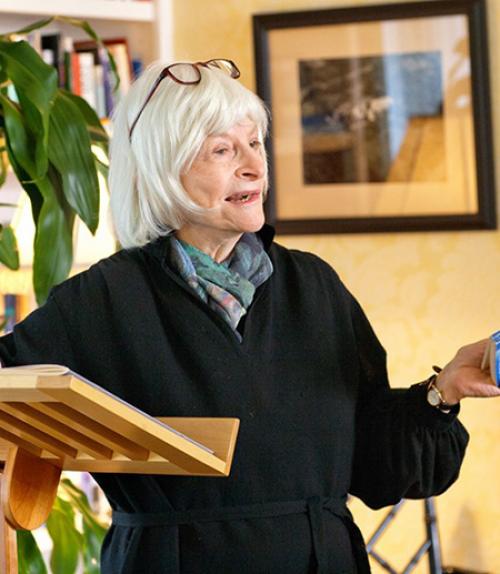Professor Emerita of English Alison Lurie, the award-winning and critically acclaimed writer who set some of her fiction on a campus with a striking similarity to Cornell’s, died Dec. 3 in Ithaca. She was 94.
She was the author of 11 novels, including the 1985 Pulitzer Prize winner and National Book Award nominee “Foreign Affairs”; “The Truth About Lorin Jones” (1988), winner of the Prix Femina Etranger; “Truth and Consequences” (2005); and “The War Between the Tates” (1974).
“Cornell was extremely fortunate to have Alison Lurie on its faculty,” said Robert Morgan, the Kappa Alpha Professor of English. “She was the first woman given tenure on the Creative Writing staff, setting a precedent for so many other women. Alison was a dynamic and gifted teacher of writing, children’s literature and folklore.”
Lurie was born in Chicago on Sept. 3, 1926, and raised in White Plains, New York. She graduated from Radcliffe College in 1947 and lived in Los Angeles from 1957 to 1961. An established author by the time she began teaching in the Department of English at Cornell in 1969, she was only the second woman in the department awarded tenure, and was named the F.J. Whiton Professor of American Literature in the College of Arts and Sciences in 1989.
Lurie taught undergraduate courses in writing and folklore, as well as one of Cornell’s first children’s literature courses in the 1970s. She retired in 2005.
Lurie was also an accomplished critic, writing essays and reviews for The New York Review of Books, and her recognition in Britain was at least as great as her fame in the United States, Morgan said.
“Her novels excel in acute observation of human manners, character, of families, lovers, colleagues. She created unforgettable portraits of our time,” he said. “Among those who knew her in Ithaca, Alison will also be remembered for her backyard receptions each fall, as well as her Pulitzer Prize-winning fiction and gracious personality.”
Lurie’s long-form fiction, with characters including starlets, UFO cultists and philandering professors, was often described as social satire. Her books ranged from thematic collections of stories and essays to critical studies, such as “Women and Ghosts,” a 1994 collection of supernatural stories; “Familiar Spirits,” a memoir of poet James Merrill; and “The Language of Clothes” (1981), a study of the psychology of fashion. “The Language of Houses: How Buildings Speak to Us” (2013) took a similar approach.
She also published collections of traditional folktales for children, including “Clever Gretchen and Other Forgotten Folk Tales,” as well as essays on children’s literature in “Don’t Tell the Grownups” and “Boys and Girls Forever.” She served as co-editor of the 73-volume Garland Library of Children’s Classics.
“Alison Lurie was both a great writer and a smart, kind, sharp and canny presence,” said Alice Fulton, MFA ’82, the Ann S. Bowers Professor of English Emerita. “Her novels – in the tradition of Jane Austen and Penelope Fitzgerald – are beautifully made, without an extraneous word. The prose is so delightful that its profundity sneaks up on you, and by the end, you might be surprised by your own tears.”
Fulton said that Lurie was her first teacher when she entered the Creative Writing program, and Lurie’s sense of fun and generosity did much to create a culture and community of writers.
“Later, I was proud to be her colleague. I seem to remember every meeting I had with Alison because of memorable things she said or simply because of her mysteriously powerful, playful aura,” Fulton said. “She published fiction and nonfiction throughout her life, and her dedication to her craft stands as a model for all artists. She was deeply unconventional, both wild and wise, and I cherish the chance I had to know her.”
Lurie spent time in London, Key West and Los Angeles, all places she used as settings for her fiction. Some of her characters reappeared in subsequent novels. Her first novel, “Love and Friendship” (1962), was set in Converse, an imaginary New England college town that cropped up again in “The Last Resort” (1998).
Many Cornellians and Ithacans may have experienced a flash of déjà vu reading about Corinth University, the fictional Ivy League school in upstate New York that served as the primary setting for several of Lurie’s novels, including “Imaginary Friends” (1967), “The War Between the Tates” and “Truth and Consequences.”
“This is the world I know – so I’m not the kind of person who can write, let us say, about 18th-century France or even 18th-century America, or gang wars in Los Angeles,” she said in a 2013 interview. “I’ve mostly written fairly close to the worlds I live in.”
“Foreign Affairs,” “The War Between the Tates” and “Imaginary Friends” were all adapted for television.
In 2012, Lurie was named New York State Author, a two-year appointment, by Gov. Andrew Cuomo.
Lurie’s other honors included Guggenheim and Rockefeller Foundation grants, the American Academy of Arts and Letters Award in Literature, and honorary doctorates from Oxford and Nottingham universities.
Whether writing about lovelorn academics or the ability of buildings to influence the way people see themselves in the world, Lurie’s wide-ranging body of work was united by her keen intelligence, probing curiosity and savvy wit.
“I’m sure that if you don’t do it,” she once said about writing, “you’ll be sorry later. And I know. Once, I had two children in diapers, and I didn’t write anything for a year. It was the most boring year of my entire life.”
She is survived by her husband, Edward Hower; her sister, Jennifer Cooke; her sons from a previous marriage, John, Jeremy and Joshua Bishop; two stepchildren; and three grandchildren.




